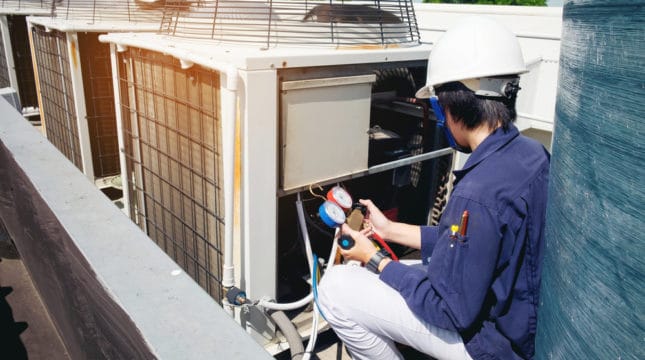Do you need a license to be a Tennessee HVAC contractor?
You need a license to work as an HVAC technician or contractor in Tennessee. You will also need a contractor’s license for jobs worth $25,000 or more. The Tennessee Board for Licensing Contractors awards and oversees the licensing process.
While the contractor license is offered at the state level, traditional journeyman and master licenses are not; these may be offered on the local level. For instance, Chattanooga has its own Journeyman Mechanic license, which is required for HVAC work. Check with local jurisdictions to understand your requirements.
Insurance requirements for a Tennessee HVAC license
You can protect your business with HVAC insurance. Your TN business insurance needs may vary based on whether you’re self-employed, have employees and assets.
Workers’ Compensation insurance
If you opt for a contractor’s license, you can hire employees. Tennessee requires employers to have workers’ compensation insurance to help cover medical expenses, injuries and lost wages in case an employee gets hurt or ill.
Learn more about workers’ compensation for contractors.
General Liability insurance
General liability insurance helps cover work-related accidents like property damage, personal or advertising injuries and bodily injuries. It’s also a requirement if you hold a contractor’s license in Tennessee; the minimum required coverage is based upon the monetary limit of a contractor. (Between $100,000–$1,000,000)
Learn more about general liability insurance for contractors.
Commercial Property insurance
Whether you rent or own, you can protect your work property, inventory and equipment with commercial property insurance. In the event of damage or vandalism, this coverage can assist with replacements, repairs and income interruptions.
Business Owner’s Policy
A business owner’s policy, or BOP insurance, provides broad coverage of general liability and commercial property policies combined in a single, cost-efficient bundle. It can help cover damage that you or your employees may accidentally cause to another person’s property and help protect your business equipment in the event of a fire or other covered event.
Tools and Equipment insurance
With tools and equipment insurance, you can help protect your tools, work gear and equipment if they are lost or stolen.
Commercial Auto insurance
Driving from job site to job site can rack up a lot of mileage and risk. You can use commercial auto insurance to cover repairs and towing in the event of an accident.
In Tennessee, coverage minimums are:
- $25,000 for each bodily injuries
- $50,000 for total injuries per accident.
- $25,000 for property damage per accident.
How to get an HVAC license in Tennessee
Get an overview of Tennessee HVAC license requirements below:
Limited licensed electrician
Tennessee classifies its first-level HVAC license as a limited licensed electrician (LLE). Here are the requirements for the LLE licensure:
- Pass the trade exam
- Pay fee of $50
- Complete citizenship form
- Submit an application
PSI administers the LLE license exam in Chattanooga, Jackson, Johnson City, Knoxville, Memphis and Nashville testing centers. The exam has 40 questions and is open-book and timed. You must score at least 73% to pass.
You can take on jobs for up to $25,000 with an LLE license. However, if you want to take on higher-paying jobs, own a business and hire employees, you will also need a contractor’s license.
Tennessee contractor license
The state of Tennessee offers two contractor licenses with HVAC classifications: CMC (Full Mechanical Contractor) and CMC-C (HVAC, Refrigeration and Gas Piping).
Here are the requirements for an HVAC contractor’s license in Tennessee:
To get the full mechanical contractor license (CMC), you must get the Board’s authorization to sit the contractor exam. However, you do not need permission for the HVAC-specific mechanical license (CMC-C)
EPA Section 608 Certification
The Environmental Protection Agency (EPA) requires HVAC professionals who deal with refrigerants to be properly certified. To obtain an EPA certification, refrigeration contractors in Tennessee must pass a multiple-choice test in no more than 3 hours. The passing score is 70%, and the exam cost is $120.
License reciprocity for Tennessee HVAC electricians
Tennessee has a reciprocity agreement with Alabama and Ohio. You can complete a license verification form to bypass many typical HVAC licensing requirements.
Tennessee license renewal requirements
If you are renewing your LLE license in Tennessee (every two years), you must complete an application and pay a $50 renewal fee.
Contractor licenses expire every two years. To renew, licensed HVAC contractors must complete an application, show proof of insurance, provide a financial statement and pay a $200 fee. Good news: there are no continuing education unit requirements for license renewal.





